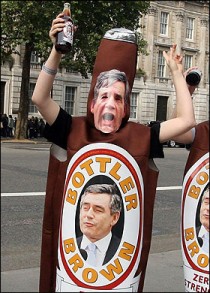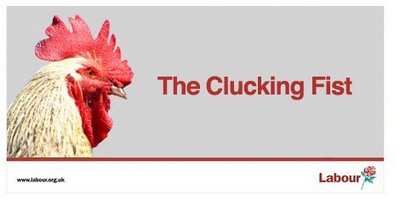The Brown inadequacy.
Just what, then, was the point of last week's dash to Basra and then Baghdad by Gordon Brown? Today's announcement in the Commons that by next spring the number of British troops in Iraq will be down to 2,500 only deepened the mystery; if Brown had really wanted to shaft the Tories he could easily have done what he told parliament today then, even if he would have broken his promise to make such new changes in policy in front of MPs. Why did he need to reannounce such a slight draw down in numbers when he apparently went to OK or at least discuss this further withdrawal with al-Malaki and other Iraqi ministers? He could have easily avoided all the justified accusations of spin and shifting the story away from the Conservatives by simply keeping his visit quiet for security reasons. The assumption has to be that this was meant to be a teaser, to be followed up by the meat today as part of the start of the election campaign, which most likely would have been declared tomorrow night.
All that was thrown out of the window once Brown understandably cowered in the face of the menacingly ominous polls. There doesn't appear to have been any contingency plan if it was decided, after nodding and winking for two weeks, that an election was just too risky, and the choices made on the hoof on Friday night led directly to the far more punishing kicking that Brown took today during his press conference. As Patrick Wintour set out in this morning's Grauniad, Team Brown first informed the 4 editors of Sunday broadsheets, then got hold of Andrew Marr so that a pre-recorded interview with Brown explaining his decision could be made the following day. Not only did this piss off ITN and Sky News by giving the BBC an exclusive, affecting their coverage, which was still far more scathing today than Nick Robinson's was, the resulting meeting of minds was so feeble, with Marr throwing numerous soft balls that it only increased the anger and tenacity of the questions put to Brown by the assembled hacks today. If Brown had instead taken the beating which he was always going to receive yesterday, touring studios or coming out and being completely honest and stating that he had considered an election but decided that it was simply too soon, he would have had a far easier ride. Instead, the bad news and humiliation was spread over three full days rather than just the two it could have been.
Watching Brown standing at the lectern, the cameras delighting in seeing his scribbled notes, each question the equivalent of another stab in the front was painful enough at home, and Brown as it went on looked more and more out of his depth. If Blair had been in the same position he would have kept the facade up; Brown simply couldn't, and it clearly showed. Whether the public will enjoy seeing a prime minister visibly squirm at the hands of the press should be interesting to find out, as Blair was only ever troubled when confronted with actual members of the public, as his appearances on various shows prior to elections and the Iraq war showed. Perhaps after Blair's seeming infallibility it might be novel, although if it continues Brown's hard-won representation for strength will quickly shatter.
It was important then that his performance in the Commons was far stronger, and this he more than managed, helped by Cameron's pre-occupation with the events of last week rather than what Brown's statement had actually just put forward. The Conservatives simply have never had a policy on Iraq, first blindly following Blair and then pursuing inquiries into it while never recanting their support or putting forward what they would either have done differently then or now, and they're not about to change that. Welcome as a call for an inquiry was, which David Cameron articulated after his backwards looking raid on last week's spin offensive, he missed the open goal taken up by Ming Campbell of just what point there was in keeping such a small number of troops at Basra airport for no overall reason. The "overwatch" stage put forward is just so much nonsense: both the government knows and the army know that their only remaining reason for staying in Iraq is because they safeguard the American convoys' transporting equipment and supplies from Kuwait through to Baghdad. Even after all this time, angering the Americans by making them deploy a few more troops to the south is strictly verboten.
That said, you perhaps sympathise with the Iraqis once you understand what's more likely to be put in place to protect those convoys once we do finally leave: the murderous, legally immune mercenaries of Blackwater, firing at the wind to "protect" their quarries which pay them so handsomely for doing so. Such sentiments aside, we know full well that the generals want out, and now, not at the end of 2008. A full withdrawal could easily have been organised for next spring, in line with all the other promises and commitments set out in Brown's statement. Instead, Brown again showed his cowardice rather than his courage, unwilling to rile the Americans that did so much to destroy his predecessor. If reports in the Torygraph are to be believed, he hasn't even learned the most vital lesson of his premiership: that the "war on terror", regardless of who's in the White House, fought in the way it has so far, has been the biggest disaster of this current century.
Equally pusillanimous was Brown's piecemeal, too little too late recognition of the sacrifices and contribution of the Iraqis themselves that have worked with the army, now increasingly facing a terrifyingly bleak future. The numbers we are talking about possibly being given refuge are in the hundreds, not the thousands, as Dan points out. To put such an arbitrary, unrealistic threshold of twelve months' service before we even give "a package of financial payments", let alone sanctuary here in the UK to such brave men and women who believed in the future of their country, regardless of the ways in which Saddam was initially brought down, is to potentially condemn some of their number to death. As Dan also identifies, to offer resettlement elsewhere in the Middle East rather than here is also to not necessarily put them out of harm's way; Syria and Jordan, countries where the vast majority of the 2 million or more Iraqis have fled, are both struggling to cope with the numbers of refugees, but are also unknown quantities at the moment. Their allure of safety may be deceiving. Any financial settlement is going to be need to be suitably generous to those who choose not to settle in the UK to make up for that shortfall in security.
It's not even as if there's going to be any major opposition to such packages or mass granting of refuge to those who have worked for us; the Sun ran an approving leader on Saturday that welcomed the assurances given to the Times, even calling it a moral obligation. They could hardly do anything else after having more than a hand in getting the war rolling in the first place. The Mail long ago dropped its support for the invasion, leaving perhaps only the Daily Express to raise noises, and who takes any notice of that busted flush any more? The government could afford to be far more daring, and it might be more down to the civil servants in the front line organising everything rather than the politicians for the stalling and so far weak acceptance of the need to act. Tomorrow's meeting, moved to Portcullis House, will emphasize this.
The whole circus of the weekend and today though only highlighted the current deficit that our politics are facing. Both Cameron and Brown represent more or less the same policies, with the Tories perhaps being the slightly harsher of the two, yet the merest switching of the polls in the marginals towards one rather than the other has supposedly triggered either a crisis or a period of navel-gazing for the prime minister. The election, had it been called, would have been nearly wholly meaningless, with both seeking power for power's sake rather than out of any real desire for actual change, despite the bluster of both parties. The Liberal Democrats have been slipping as a result, yet they are currently offering the only major critique of both parties' style and rhetoric, with Nick Clegg effortlessly on Newsnight exposing both Theresa May and John Denham's arguments as facile. The great shame is that we've been denied a contest which could have helped bring about the major step change that politics needs to get out of its current, seemingly inexorable decline.
Labels: election fever, Gordon Brown, Iraq withdrawal, no November election, refuge for Iraqis, we can't turn them away



